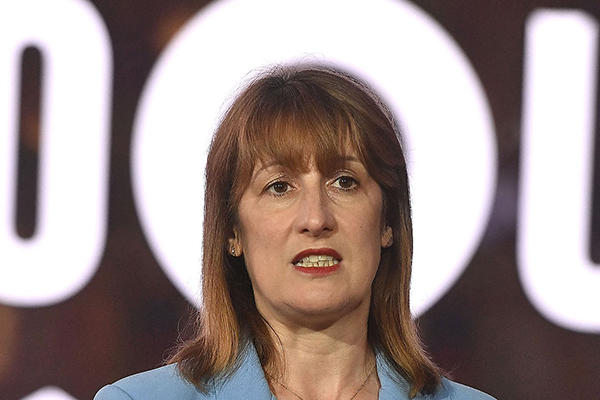UK bank shares and the impact of a Budget tax swoop
It’s rumoured the chancellor is planning a huge tax raid on domestic lenders in the autumn. City writer Graeme Evans reveals what analysts think will actually happen.
2nd September 2025 13:06
by Graeme Evans from interactive investor

Chancellor Rachel Reeves speaking during a visit to Belfast last month. Credit: Oliver McVeigh/POOL/AFP via Getty Images.
An upgrade for “undervalued” Barclays (LSE:BARC) and Buy recommendation on NatWest Group (LSE:NWG) have highlighted City optimism that the UK bank sector will weather uncertainty about a possible Autumn Budget tax grab.
Shares fell sharply on Friday after the Institute for Public Policy Research (IPPR) suggested a levy on the income generated by commercial banks on reserves held with the Bank of England.
- Invest with ii: Top UK Shares | Share Tips & Ideas | Open a Trading Account
The think-tank argued that this would help end the £22 billion of annual taxpayer losses caused by the Bank’s quantitative easing programme.
NatWest shares fell the most in Friday’s sell-off and have remained 5% below Thursday’s close after a broad range of UK assets were hit by fiscal uncertainty in today’s session.
While the chances of a greater tax contribution from the banking industry have increased, a number of City firms believe that a windfall tax on central bank reserves is unlikely.
Bank of America analysts said this week that the most likely avenue is a higher banking industry surcharge, which is currently at 3% compared with 8% prior to 2023.
If the surcharge is increased to 5%, the bank estimates an approximate 3% reduction to forecast 2026 attributable profit for Lloyds Banking Group (LSE:LLOY) and NatWest and 1.5% for Barclays.
- Stockwatch: does AI justify this cyclical share’s growth rating?
- Insider: at least one of these four stocks is ‘simply too cheap’
- Huge month for dividends as Lloyds Bank, BP, Shell, L&G pay out
Deutsche Bank estimates the IPPR’s suggested levy on central bank reserves could have a 10% earnings impact on the UK banks, with NatWest most affected.
But it points out there are many complications: “First, quantifying the reserve base at bank level is impossible. Second, tying a tax to liquidity would encourage banks to repay liquidity facilities and could quickly contract monetary supply.
“Third, a large part of the banking system is building societies which operate with very low margins and would be disproportionately impacted. Lastly, the risk that it interferes with monetary transmission is high.”
Shore Capital added: “Overall, we view the IPPR’s proposal as being well thought through but question whether such a levy could ultimately have a negative impact on the government’s economic growth agenda by increasing the cost of capital for the banks and so reducing their appetite to lend.”
According to industry body UK Finance, the total tax rate including employment taxes for a model bank operating in the UK is already “notably” higher than other global financial centres.
UBS said the government’s growth economy agenda required a lower hurdle rate.
It added: “While we are not ruling out additional bank taxes, we see bank taxes of moderate size applied in a uniform fashion as an input cost shock which a rational industry with pricing power would pass to customers in time.”
In its analysis, UBS said a valuation multiple of 7.6 times forecast 2026 earnings left UK banks at a 14% discount to the European sector despite stronger net interest income growth.
UBS has Buy ratings on Barclays, NatWest and Paragon Banking Group (LSE:PAG), and Neutral ratings on Lloyds Banking Group and Close Brothers Group (LSE:CBG).
Bank of America (BofA) is also a supporter of Barclays shares, having reiterated its Buy stance and increased its price target to 435p in a note published yesterday.
It said Barclays was now one of the cheapest banks, lagging the re-rated sector by as much 50-60% in valuation terms even though the shares have risen 30-40% year-to-date.
- eyeQ: why L&G and Aviva shares are now cheap
- ii view monthly round-up: August 2025
- Shares for the future: why this company is still a top two stock
BofA said this was despite strong delivery at the midpoint of the company’s strategy cycle and an operating environment better than had been expected in 2023. It also notes the scope for outperformance from self-help measures, including cost management.
The bank adds: “Part of the share price underperformance this year versus the sector likely relates to its US exposure, but with the US economy more resilient than expected and the investment banking outlook much improved, we do not think the discount is warranted.”
Without making any “particularly heroic assumptions” about the operating environment, the bank sees a 5-6% upside to 2026-27 consensus profit forecasts.
These articles are provided for information purposes only. Occasionally, an opinion about whether to buy or sell a specific investment may be provided by third parties. The content is not intended to be a personal recommendation to buy or sell any financial instrument or product, or to adopt any investment strategy as it is not provided based on an assessment of your investing knowledge and experience, your financial situation or your investment objectives. The value of your investments, and the income derived from them, may go down as well as up. You may not get back all the money that you invest. The investments referred to in this article may not be suitable for all investors, and if in doubt, an investor should seek advice from a qualified investment adviser.
Full performance can be found on the company or index summary page on the interactive investor website. Simply click on the company's or index name highlighted in the article.